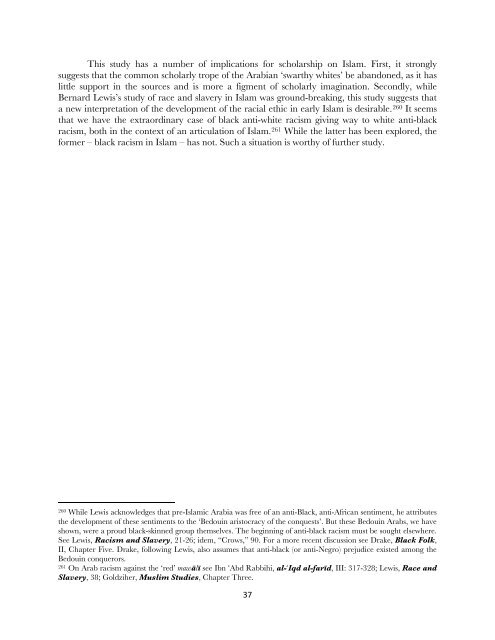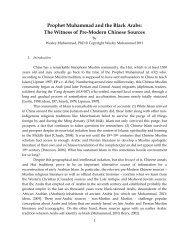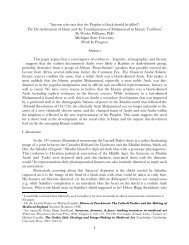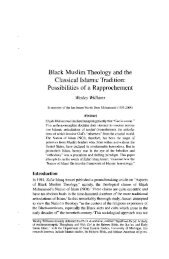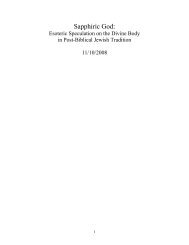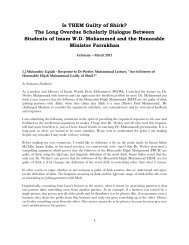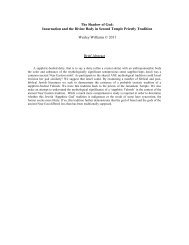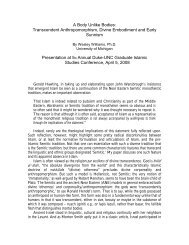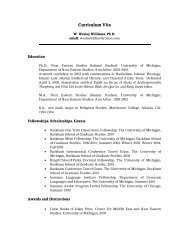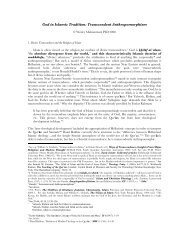including explicit testimony in <strong>the</strong> literary sources. While testimony to a fair-skinned MuÈammad <strong>is</strong> found <strong>the</strong>re as well, th<strong>is</strong> <strong>is</strong> no doubt a secondary development <strong>that</strong> was impacted by <strong>the</strong> changed status of Arabs and non-Arabs within <strong>the</strong> kingdom. <strong>The</strong> biography of <strong>the</strong> prophet MuÈammad as found in <strong>the</strong> standard sÊra texts <strong>is</strong> undoubtedly tendentious. It was shaped not only by sectarian d<strong>is</strong>putes within Islam, but also by inter-faith dialogue and d<strong>is</strong>pute <strong>be</strong>tween Muslims and <strong>the</strong> non-Muslim subject peoples within <strong>the</strong> kingdom. 255 <strong>The</strong> portraits of <strong>the</strong> <strong>Prophet</strong>, literary and v<strong>is</strong>ual, are likew<strong>is</strong>e equally tendentious. Oleg Grabar and Mika Natif suggest <strong>that</strong> <strong>the</strong>se prophetic portraits were affected by popular tastes. 256 It appears <strong>that</strong> with <strong>the</strong> fall of <strong>the</strong> Arab kingdom, <strong>the</strong>re was little popular taste for an ethnically Arab prophet. 257 At a point in <strong>the</strong> #Abb§sid period, <strong>the</strong> Muslim populace <strong>be</strong>came preponderantly non-Arab, 258 and Persian culture was more influential than any o<strong>the</strong>r for a while after <strong>the</strong> Revolution. Tarif Khalidi has suggested <strong>that</strong> <strong>the</strong> biography of <strong>the</strong> <strong>Prophet</strong> might <strong>be</strong> seen as a form of synecdoche, in which <strong>the</strong> individual life stands for, symbolizes, and prefigures <strong>the</strong> larger communal h<strong>is</strong>tory. 259 In th<strong>is</strong> regard, th<strong>is</strong> de-arabization of MuÈammad no doubt reflects <strong>the</strong> de-arabization of <strong>the</strong> umma MuÈammadiyya and Islamic tradition. 255 EQ 5:29-51 s.v. SÊra and <strong>the</strong> Qur"§n by Wim Raven; Tilman Nagel, Mohammed: Le<strong>be</strong>n and Legend (Munich: Oldenbourg, 2008); idem, Allahs Liebling: Ursprung und Erscheinungsformen des Mohammedglau<strong>be</strong>n (Munich: Oldenbourg, 2008); Cottfried Hagen, “<strong>The</strong> Imagined and <strong>the</strong> H<strong>is</strong>torical MuÈammad,” JAOS 129 (2009): 97-111; Her<strong>be</strong>rt Berg, Method and <strong>The</strong>ory in <strong>the</strong> Study of Islamic Origins (Leiden: Brill, 2003); H. Motzi (ed.), <strong>The</strong> Biography of MuÈammad. <strong>The</strong> Issue of <strong>the</strong> Sources (Leiden, 2000); Michael Cook, Muhammad (Oxford: Oxford University Press, 1996) Chapter 7 (“<strong>The</strong> sources”); M. Schöller, Exeget<strong>is</strong>ches Denken und <strong>Prophet</strong>enbiographie. Eine quellenkrit<strong>is</strong>che Analyse der SÊra Ü<strong>be</strong>rlieferung zu MuÈammads Konflikt mit den Juden (Berlin, 1996); Uri Rubin, <strong>The</strong> Eye of <strong>the</strong> Beholder: <strong>The</strong> Life of MuÈammad as Viewed by <strong>the</strong> Early Muslims. A Textual Analys<strong>is</strong> (Princeton, New Jersey: <strong>The</strong> Darwin Press, 1995); F.E. Peters, “<strong>The</strong> Quest of <strong>the</strong> H<strong>is</strong>torical Muhammad,” IJMES 23 (1991): 291-315; Patricia Crone, Meccan Trade and <strong>the</strong> R<strong>is</strong>e of Islam (Princeton, New Jersey: Princeton University Press, 1987) Chapter 9 (“<strong>The</strong> Sources”); Sebastian Gün<strong>the</strong>r, “MuÈammad, <strong>the</strong> Illiterate <strong>Prophet</strong>: An Islamic Creed in <strong>the</strong> Qur’an and Qur’anic Exeges<strong>is</strong>,” JQS 4 (2002): 1-26; Isaiah Goldfeld, “<strong>The</strong> Illiterate <strong>Prophet</strong> (NabÊ UmmÊ): An inquiry into <strong>the</strong> development of a dogma in Islamic Tradition” Der Islam 57 (1980): 58-67; Sara Stroumsa, “<strong>The</strong> Signs of Prophecy: <strong>The</strong> Emergence and Early Development of a <strong>The</strong>me in Arabic <strong>The</strong>ological Literature,” HTR 78 (1985): 101-14; Sidney H. Griffith, “<strong>The</strong> <strong>Prophet</strong> MuÈammad, H<strong>is</strong> Scripture and H<strong>is</strong> Message According to <strong>the</strong> Chr<strong>is</strong>tian Apologies in Arabic and Syriac From <strong>the</strong> First Abbasid Century,” in La Vie du prophete Mahomet; colloque de Strasbourg, octobre 1980 (Par<strong>is</strong>: Presses universitaires de France, 1983) 99- 146; idem, “Comparative Religion in <strong>the</strong> Apologetics of <strong>the</strong> First Chr<strong>is</strong>tian Arabic <strong>The</strong>ologians,” in Proceedings of <strong>the</strong> Patr<strong>is</strong>tic, Mediaeval and Rena<strong>is</strong>sance Conference 4 (1979): 63-87; Richard C. Martin, “<strong>The</strong> Role of <strong>the</strong> Basrah Mutazilah in Formulating <strong>the</strong> Doctrine of <strong>the</strong> apologetic Miracle,” JNES 39 (1980) 175-89; R. Sellheim, “<strong>Prophet</strong>, Calif und Geschichte. Die Muhammad-Biographie des Ibn Isȧq,” Oriens 18-19 (1965-66): 33-91; Harr<strong>is</strong> Birkeland, <strong>The</strong> Lord Guideth. Studies on Primitive Islam (Oslo: I Komm<strong>is</strong>jon Hos H. Aschehoug & Co. [W. Nygaard], 1956); Geo Widengren, MuÈammad, <strong>the</strong> Apostle of God, and h<strong>is</strong> Ascension (Uppasala/Wiesbaden, 1955); Joseph Horovitz, “<strong>The</strong> Growth of <strong>the</strong> Mohammed Legend,” MW 10 (1920): 49-58; Tor Andrae, Die person Muhammeds in lehre und glau<strong>be</strong>n seiner gemeinde (Stockholm: P.A. Vorstedt og söner, 1918). Th<strong>is</strong> <strong>is</strong> not to say <strong>that</strong> we can’t mine th<strong>is</strong> mass of late traditional material for imformation related to early Islam. See especially Andreas Görke and Gregor Schoeler, Die ältesten Berichte ü<strong>be</strong>r das Le<strong>be</strong>n MuÈammads: Das Korpus #Urwa ibn az-Zubair (Princeton, NJ: <strong>The</strong> Darwin Press, Inc., 2008). 256 Grabar and Naif, “Story of Portraits of <strong>the</strong> <strong>Prophet</strong>,” 33. 257 Ali’s observation seems quite germane here: “although <strong>the</strong> description of <strong>the</strong> <strong>Prophet</strong> (viz. as ruddy-white, etc.) <strong>is</strong> quite explicit in <strong>the</strong> Arabic annals, <strong>the</strong>re <strong>is</strong> not a single picture painted by an Arab <strong>that</strong> portrays him. On <strong>the</strong> o<strong>the</strong>r hand, among <strong>the</strong> Turks, <strong>the</strong> Persians and <strong>the</strong> Indians, <strong>who</strong>se art<strong>is</strong>tic heritage had <strong>be</strong>en rich in pictorial images and <strong>who</strong>se language <strong>is</strong> o<strong>the</strong>r than Arabic, <strong>the</strong> <strong>Prophet</strong> was actually portrayed…” Ali, “Literal to <strong>the</strong> Spiritual,” 10. 258 Berkey, Formation, 118. 259 Khalidi, Images, 3. 36
Th<strong>is</strong> study has a num<strong>be</strong>r of implications for scholarship on Islam. First, it strongly suggests <strong>that</strong> <strong>the</strong> common scholarly trope of <strong>the</strong> Arabian ‘swarthy whites’ <strong>be</strong> abandoned, as it has little support in <strong>the</strong> sources and <strong>is</strong> more a figment of scholarly imagination. Secondly, while Bernard Lew<strong>is</strong>’s study of race and slavery in Islam was ground-breaking, th<strong>is</strong> study suggests <strong>that</strong> a new interpretation of <strong>the</strong> development of <strong>the</strong> racial ethic in early Islam <strong>is</strong> desirable. 260 It seems <strong>that</strong> we have <strong>the</strong> extraordinary case of <strong>black</strong> anti-white rac<strong>is</strong>m giving way to white anti-<strong>black</strong> rac<strong>is</strong>m, both in <strong>the</strong> context of an articulation of Islam. 261 While <strong>the</strong> latter has <strong>be</strong>en explored, <strong>the</strong> former – <strong>black</strong> rac<strong>is</strong>m in Islam – has not. Such a situation <strong>is</strong> worthy of fur<strong>the</strong>r study. 260 While Lew<strong>is</strong> acknowledges <strong>that</strong> pre-Islamic Arabia was free of an anti-Black, anti-African sentiment, he attributes <strong>the</strong> development of <strong>the</strong>se sentiments to <strong>the</strong> ‘Bedouin ar<strong>is</strong>tocracy of <strong>the</strong> conquests’. But <strong>the</strong>se Bedouin Arabs, we have shown, were a proud <strong>black</strong>-skinned group <strong>the</strong>mselves. <strong>The</strong> <strong>be</strong>ginning of anti-<strong>black</strong> rac<strong>is</strong>m must <strong>be</strong> sought elsewhere. See Lew<strong>is</strong>, Rac<strong>is</strong>m and Slavery, 21-26; idem, “Crows,” 90. For a more recent d<strong>is</strong>cussion see Drake, Black Folk, II, Chapter Five. Drake, following Lew<strong>is</strong>, also assumes <strong>that</strong> anti-<strong>black</strong> (or anti-Negro) prejudice ex<strong>is</strong>ted among <strong>the</strong> Bedouin conquerors. 261 On Arab rac<strong>is</strong>m against <strong>the</strong> ‘red’ maw§lÊ see Ibn #Abd Rabbihi, al-#Iqd al-farÊd, III: 317-328; Lew<strong>is</strong>, Race and Slavery, 38; Goldziher, Muslim Studies, Chapter Three. 37


